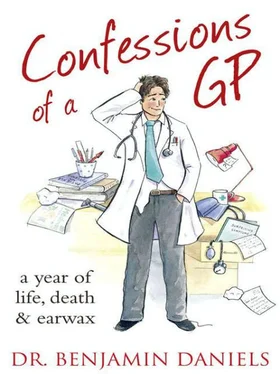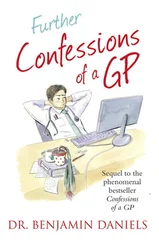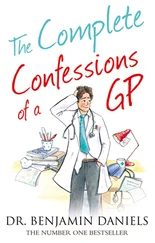As I let them know that they were free to go, the German man got his wallet out and tried to give me his Visa card. I explained that he didn’t have to pay me so he then started giving me his address so that he could be billed at home. I literally had to spend ten minutes convincing him that the treatment he had received was free of charge. ‘But everyone has been so good to us,’ he protested. ‘I wouldn’t have got any better treatment back home. Why do you British spend so much time complaining about your health service?’ It was one of those moments where I simply felt an overwhelming pride to be a part of the NHS. Of course, there are days when I spend a lot of time apologising for the inadequacies of the NHS, but overall I still believe that if you are genuinely unwell or have an accident, there aren’t many places on the planet where you would get a better service.
Sitting around with a bunch of GPs recently, I was surprised by how many thought that there should be a charge to be seen in A&E or by a GP. The general consensus was that £5 would be just enough to keep out some of the time-wasters and make people think twice before pitching up to see us. I have to say I couldn’t disagree more. I appreciate that the NHS isn’t free because we pay for it with our taxes, but it is free at the point of delivery and I feel that is something fundamentally vital in maintaining some of the original ideals of Nye Bevan and the other founders of the NHS. A charge would keep away some of the more vulnerable people who needed our help most and suddenly change the dynamic and mindset of the patients who would now be paying directly for our services.
Sixteen tablets of a supermarket’s own brand ibuprofen cost just 35p, while 16 tablets of Neurofen cost £1.99. This is strange to believe considering they really are exactly the same medicine. The drug company that makes Neurofen uses clever advertising and packaging to convince us to pay over five times more money than we need to.
Drug companies are very good at overcharging us for medicine. In the world of prescription drugs, millions of pounds are wasted by the NHS because doctors prescribe expensive ones when they could be prescribing much cheaper versions of exactly the same medicines. How do the pharmaceutical companies hoodwink us into doing that? Again, it is all about marketing. Young and attractive drug reps come and promote their drugs, while buying us lunch or even taking us out for dinner at posh restaurants. They feed us biased information on why we should use their more expensive medicine and give us free pens and mugs sporting their brand. (There are now much stricter rules than there used to be about how much drug reps can spend on us doctors. For example, the free gifts that they give us now have to be under the value of £5 and when drug reps take us all out for a slap-up meal, there has to be an ‘educational’ component to the evening rather than a completely uninterrupted session of good food and expensive wine. The drug companies’ all-expenses-paid trips to ‘conferences’ in the Caribbean have stopped, too.)
I used to attend the lunches and dinners. As I pocketed the free gifts and scoffed down the expensive nosh, I convinced myself that we doctors were too ‘savvy’ to be influenced by colourful flip charts and pretty smiles. The pharmaceutical industry, of course, knows that this isn’t the case. A few hundred quid taking some GPs out for dinner is peanuts compared to the money they can make if one or two of us start prescribing their drug.
In the USA, pharmaceutical companies employ ex-American football players and cheerleaders to sell their products. Doctors are suckers for a pretty face like everyone else. The attractive female reps are sent to sell their products to the predominantly male surgical consultants, while the pretty-boy male reps sell to the more female-dominated obstetric and paediatric departments. Fortunately in this country, our retired sports stars tend to fall ungracefully into alcoholism and gambling addiction rather than trying to sell us overpriced medicines. I can’t imagine even the most star-struck doctor being convinced to prescribe an antidepressant promoted by Gazza or a painkiller endorsed by Vinnie Jones.
As well as constant pressure from drug reps, GPs also face resistance from patients when trying to change medication. Whenever I can, I try to switch my patients from the more expensive medicines to the cheaper ones that do the same thing. Unfortunately, this can be very unpopular with patients. Often they get used to a certain packet and tablet colour and no amount of persuasion will convince them to switch. One elderly lady once stormed into my surgery furious that I had changed her medicine:
‘You told me that the new medicine was the same as the old one!’
‘Yes that’s right, Mrs Goodson – same medicine, but different name.’
‘Well, I know that’s nonsense because when I try to flush these tablets down the toilet, they don’t float like the old ones did.’
Drug reps have the cheek to claim that they are helping to educate us by updating us on the latest scientific research. This is, of course, nonsense as their only interest is flogging their drug and earning a commission if prescribing rates of their drug increase on their patch. They give ruthlessly one-sided presentations that show their pill to be wonderful and ignore the parts of the research that don’t paint their drug so favourably.
Having finally realised that I will only ever get biased information from the pharmaceutical industry, I now refuse to see any drug reps. They hover around the reception desk like prowling hyenas, only to be batted away by the fierce receptionist. Not having the time or inclination to read all the medical journals myself, I rely on the local NHS pharmacist to keep me up to date with the new medications on the market. She is a fount of knowledge on all the latest scientific research and doesn’t work on commission. Like me, she has the best interest of the patient at heart, while also keeping half an eye on the NHS budget. There really is no such thing as a free lunch and so I’ll pay for my own, thanks.
Mr Tipton, the paedophile
I had been asked to go on a home visit to see a patient I hadn’t met before. Mr Tipton was in his fifties and complaining of having diarrhoea. There was some kind of gastric flu going round at the time, but normally a 50-year-old could manage the squits without needing a doctor’s visit.
As I skimmed through his notes, there was one item that stood out. In between entries for a slightly high blood pressure reading and a chesty cough was ‘imprisonment for child sex offences’. Mr Tipton was a paedophile. There were no gory details of his offences but he had spent six years in prison and had only recently been released.
Mr Tipton lived in Somersby House. Despite the pleasant sounding name, Somersby House is a shithole, a 17-storey 1960s tower block as grey and intimidating on the inside as it is on the outside. As I waited an eternity for the lift to climb the 17 floors, I wondered if the strong smell of stale urine was coming from one of my fellow passengers or the building as a whole. The grey-faced natives eyed me suspiciously; I was looking conspicuously out of place in my shiny shoes and matching shirt and tie. A mental note was made to keep a spare tracksuit and baseball cap in the car to disguise myself on my next visit.
I was annoyed and ashamed by how uncomfortable I felt in Somersby House. When I started medical school I felt distinctly ‘street’. While most of my compatriots were privately educated somewhere in the Home Counties, I went to an inner city comprehensive. Why was I feeling so bloody middle class? Medical school had not only desensitised me to death and suffering, it had also turned me into a snob.
Читать дальше
Конец ознакомительного отрывка
Купить книгу











![Benjamin Franklin - Memoirs of Benjamin Franklin; Written by Himself. [Vol. 2 of 2]](/books/747975/benjamin-franklin-memoirs-of-benjamin-franklin-wr-thumb.webp)
![Benjamin Franklin - Memoirs of Benjamin Franklin; Written by Himself. [Vol. 1 of 2]](/books/748053/benjamin-franklin-memoirs-of-benjamin-franklin-wr-thumb.webp)